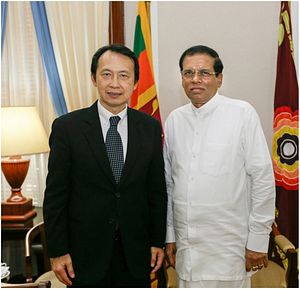There was another high-level U.S. visit to Sri Lanka this week. State Department Counselor Thomas Shannon visited the island nation from December 14-16. The highlight of his trip seems to have been the formal announcement that the first “U.S.-Sri Lanka Partnership Dialogue” will be held in Washington this February. The dialogue will focus on four broad areas: governance, development cooperation, and people-to-people ties; both economic and security cooperation; and global and regional affairs.
Shannon’s remarks after his meeting with Sri Lanka’s Foreign Minister, Mangala Samaraweera, were very optimistic. Here’s part of what he said:
Sri Lanka’s contributions to the development of a regional consciousness – one that promotes the values of democratic governance and respect for human rights, freedom of navigation, sustainable development, and environmental stewardship are noteworthy.
We welcome Sri Lanka’s contributions to global peacekeeping and humanitarian disaster assistance and believe that your armed forces can also play a constructive role in ensuring a bright future.
In May, Secretary Kerry and the Foreign Minister announced that our two governments would launch a Partnership Dialogue to build on that history of exchange and to intensify our cooperation across the board and to further enhance our relationship.
On December 15 in Trincomalee, Shannon spoke about development assistance and the work of the United States Agency for International Development (USAID). On December 16 in Colombo, he had more words of praise for Sri Lanka. Here’s a paragraph from that speech:
Sri Lanka is an example of the power of citizens to reinvigorate their democracy, to retake control – through the ballot box – of their country’s trajectory, and to set a course to a brighter future. We now look to Sri Lanka to also provide inspiration to others around the world, to show them how justice and compassion can overcome a difficult past and help create a stable and prosperous future, and strengthen a nation’s security, prosperity, and prestige.
In his December 16 speech, Shannon made a fleeting reference to accountability for wartime abuses and the recently passed UN Human Rights Council resolution on Sri Lanka. Yet, quite clearly, the focus of his trip was elsewhere.
With each passing month, U.S. support for Sri Lanka appears to be getting stronger and the prospects of the Barack Obama administration applying more sustained diplomatic pressure on Colombo (regarding accountability for wartime abuses, ongoing human rights abuses, and other difficult, unresolved subjects) looks increasingly unlikely. Indeed, this slobbering love affair seems be in full swing.
The possibility of Obama visiting Sri Lanka has been on the table for some time and Shannon’s visit would suggest that the president certainly hasn’t ruled out such a trip. Given the way U.S.-Sri Lanka ties have been evolving, one could even imagine Obama visiting both Myanmar and Sri Lanka next year, perhaps even on the same trip – talking human rights, improved governance and successful democracy promotion efforts. We’d likely hear about “historic moments” and U.S. “engagement.” We’d probably be reminded of the importance of trade, aid, and free elections, while linking it all to America’s pivot to Asia. An outgoing U.S. president, quite conveniently, would have a pair of foreign affairs success stories; those seem to be in short supply these days.

































